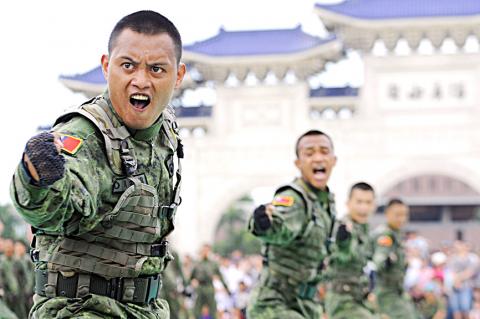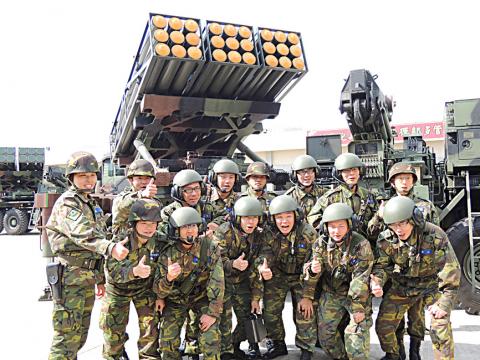More than 20 retired generals last month traveled to China to meet with their former Chinese counterparts and current government officials, despite the Ministry of National Defense (MND) and the Vocational Assistance Commission for Retired Service’s efforts to dissuade them from taking the trip, military sources said.
Generals Cheng Ting-chung (陳廷寵) and Li Chen-lin (李楨林), and former commander-in-chief of the Republic of China Army Huang Hsing-chiang (黃幸強) led the group to attend the sixth edition of a cross-strait retired generals festival in Foshan City, Guangdong Province, the sources said.
The festival is part of a series of events marking the 90th anniversary of the Whampoa Military Academy (黃埔軍校), the Republic of China Military Academy’s predecessor.

Photo: Chen Chih-chu, Taipei Times
The academy was established in 1924 in Guangzhou, Guangdong Province. It produced many elite military officers who fought in the eight-year Second Sino-Japanese War.
Chiang Kai-shek (蔣介石) re-established the academy in Greater Kaohsiung’s Fengshan District (鳳山) after the Chinese Nationalist Party (KMT) government retreated to Taiwan after the Chinese Civil War.
Its alumni include former Chinese vice premier Lin Biao (林彪) and former Chinese premier Zhou Enlai (周恩來).

Photo: Lo Tien-pin, Taipei Times
Anonymous military officials said that at the festival last month, the retired generals discussed with their Chinese counterparts issues concerning a cross-strait military confidence-building mechanism.
During the talks, some members of the Taiwanese delegation said that only after such a mechanism is establish will both sides have the space in which to conduct political negotiations and perhaps sign political agreements.
The sources said that the ministry and the commission tried several times to persuade the generals to not take the trip so as to avoid making pro-unification implications.
While the groups that received the Taiwanese delegation brand themselves as civic organizations, they are supported by the Chinese People’s Liberation Army and China’s United Front Work Department, the sources said.
In related developments, the ministry said it is to mark the 90th anniversary of the Whampoa Military Academy with a series of events this month and next month.
As part of the celebrations, the Republic of China Military Academy is to open its campus to the public on Friday, while the Thunder Tiger Aerobatics Team and the army’s Airborne Brigade Sky Diving Team will perform a show, the ministry said.
In addition, advanced weapon systems, including the Thunderbolt-2000 RT/LT-2000 and PAC-3 launcher system, are to be displayed at the Chiang Kai-shek Memorial Hall’s Liberty Square in Taipei on June 7, while an exhibition of historical relics and documents from the Whampoa Military Academy will be held at the Military Historical Relic Museum in Taipei on June 13, it added.

US climber Alex Honnold is to attempt to scale Taipei 101 without a rope and harness in a live Netflix special on Jan. 24, the streaming platform announced on Wednesday. Accounting for the time difference, the two-hour broadcast of Honnold’s climb, called Skyscraper Live, is to air on Jan. 23 in the US, Netflix said in a statement. Honnold, 40, was the first person ever to free solo climb the 900m El Capitan rock formation in Yosemite National Park — a feat that was recorded and later made into the 2018 documentary film Free Solo. Netflix previewed Skyscraper Live in October, after videos

NUMBERS IMBALANCE: More than 4 million Taiwanese have visited China this year, while only about half a million Chinese have visited here Beijing has yet to respond to Taiwan’s requests for negotiation over matters related to the recovery of cross-strait tourism, the Tourism Administration said yesterday. Taiwan’s tourism authority issued the statement after Chinese-language daily the China Times reported yesterday that the government’s policy of banning group tours to China does not stop Taiwanese from visiting the country. As of October, more than 4.2 million had traveled to China this year, exceeding last year. Beijing estimated the number of Taiwanese tourists in China could reach 4.5 million this year. By contrast, only 500,000 Chinese tourists are expected in Taiwan, the report said. The report

Temperatures are forecast to drop steadily as a continental cold air mass moves across Taiwan, with some areas also likely to see heavy rainfall, the Central Weather Administration (CWA) said. From today through early tomorrow, a cold air mass would keep temperatures low across central and northern Taiwan, and the eastern half of Taiwan proper, with isolated brief showers forecast along Keelung’s north coast, Taipei and New Taipei City’s mountainous areas and eastern Taiwan, it said. Lows of 11°C to 15°C are forecast in central and northern Taiwan, Yilan County, and the outlying Kinmen and Lienchiang (Matsu) counties, and 14°C to 17°C

STEERING FAILURE: The first boat of its class is experiencing teething issues as it readies for acceptance by the navy, according to a recent story about rudder failure The Hai Kun (海鯤), the nation’s first locally built submarine, allegedly suffered a total failure of stern hydraulic systems during the second round of sea acceptance trials on June 26, and sailors were forced to manually operate the X-rudder to turn the submarine and return to port, news Web site Mirror Daily reported yesterday. The report said that tugboats following the Hai Kun assisted the submarine in avoiding collisions with other ships due to the X-rudder malfunctioning. At the time of the report, the submarine had completed its trials and was scheduled to begin diving and surfacing tests in shallow areas. The X-rudder,